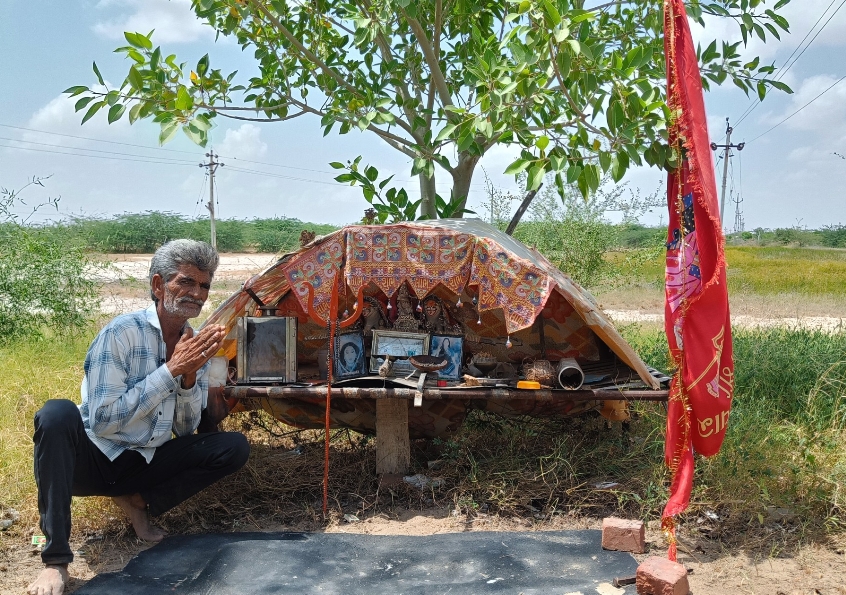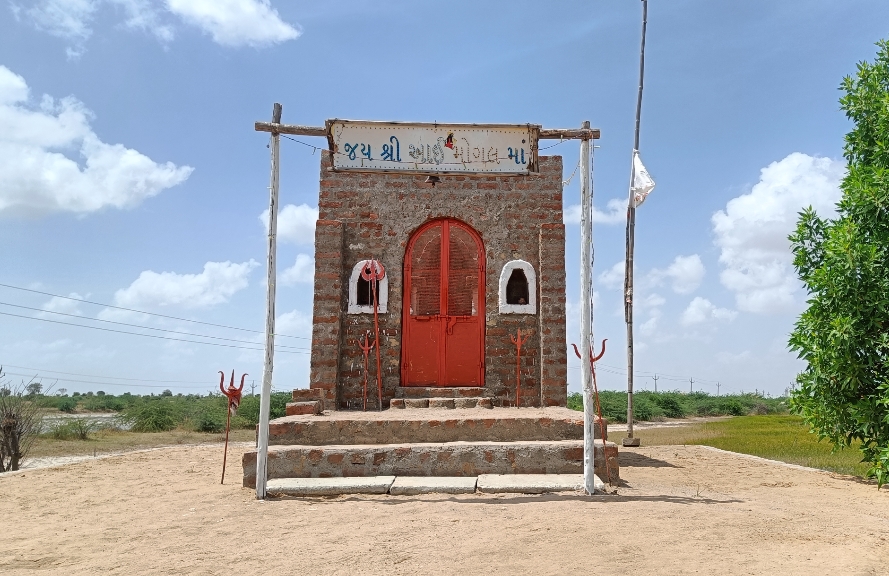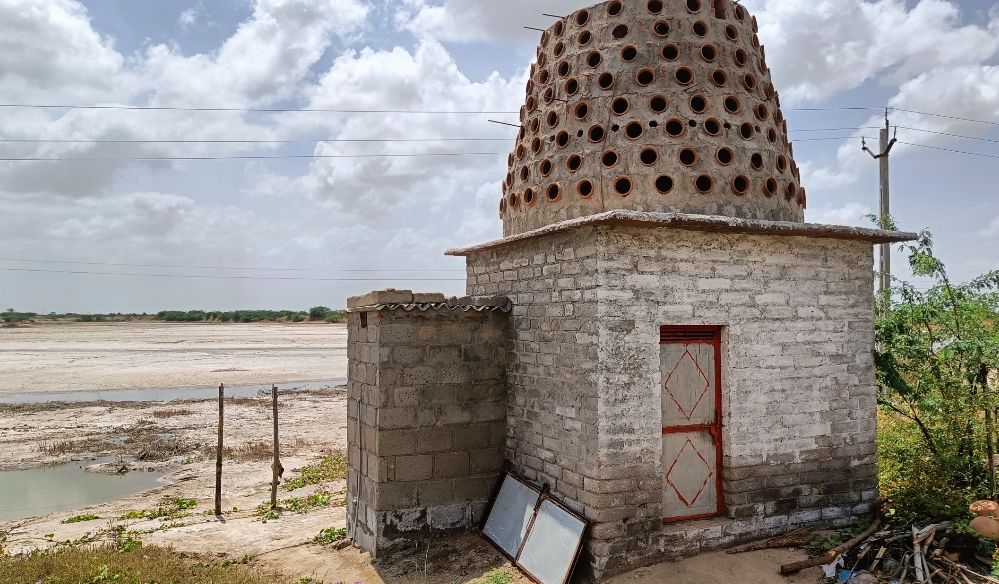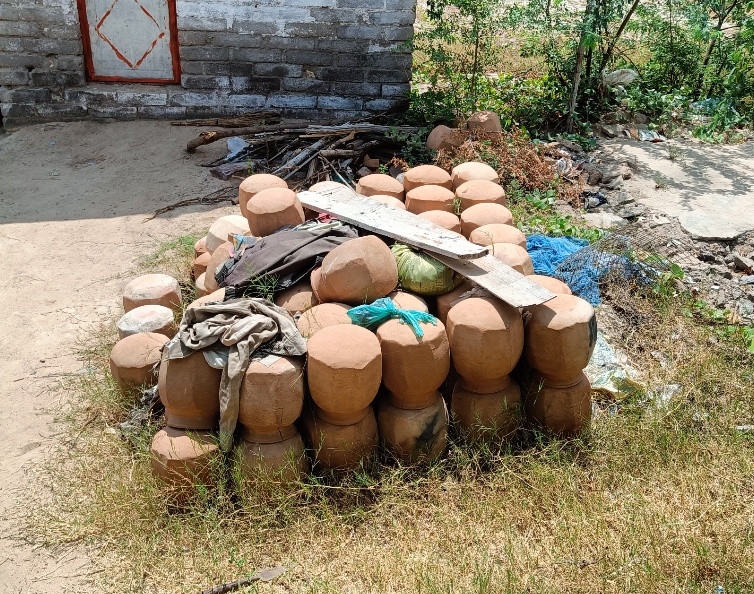What goes on in the mind of a person who decides to build a temple in India?
India is a land where temples echo with centuries of spirituality and devotion. Over the annals of time, kings and rulers have commissioned the construction of an astonishing multitude of temples, each bearing testament to the rich tapestry of our cultural heritage. Even today, this sacred tradition endures, with new temples continuing to grace our landscapes. In the bygone era, these temples stood as veritable hubs of culture and knowledge, nurturing education in its myriad forms.
Through my modest experiences and observations, I have gleaned that the task of building temples is often shouldered by the affluent, a form of fulfilling one’s Dharma and contributing to the community. During my extensive cycling expedition across the expanse of India, I had the privilege of meeting an extraordinary individual Hamir Bhai Gangaji Parmar, a vibrant 62-year-old visionary. Nestled in the remote desert village of Suigam in Gujarat, an arid land devoid of lush vegetation and ample water, Hamir Sir is leading the construction of a temple dedicated to Mogol Ma, a revered goddess in the region.

Majority of life lived without purpose
Born into a family burdened by poverty, Hamir Sir faced adversity from a tender age, being one of four siblings—two brothers and two sisters. At the age of 12, a simple mishap triggered a life-altering event. Tasked with procuring 10 Paisa worth of kerosene for a lamp at home, he lost the money, a precious sum for his struggling family. His father’s disappointment and anger pushed Hamir to flee in humiliation, with nothing more than the clothes on his back—a stark reminder of their impoverished circumstances.
In the dead of night, he embarked on a journey, boarding a train bound for Mumbai, 30 kilometers away from his hometown. There, he secured a job as a cleaner and ticket collector at a cinema theater in the bustling Majestic complex. For two years, he toiled in this capacity until fate introduced him to Deepak, a man from Jamnagar, Gujarat, who owned his own cinema theater. Deepak saw potential in Hamir and brought him back to Gujarat, employing him at “Deepak Cinema” in Jamnagar. Hamir devoted a year to this job before setting off for Rajkot.
In Rajkot, he crossed paths with an advocate seeking assistance with household chores. Hamir’s diligence impressed the advocate, who encouraged him to pursue an education. Thus, Hamir recommenced his schooling, eventually completing up to the 10th grade. Still, a restless spirit drove him to continue his journey. Embarking on a remarkable odyssey, he traversed the length and breadth of India for the next 10 to 12 years, subsisting on meager means, finding shelter on the streets, and nourishment wherever it was available.
A decade later, Hamir returned to Rajkot and secured employment in a hotel, marking a turning point in his life’s narrative.
Life lived with forced purpose
Upon Hamir Sir’s return to Rajkot, word quickly reached his family that he was working at a hotel. They swiftly brought him back and arranged for him to marry, anchoring him to a specific place. Thus began the second phase of Hamir Sir’s life, where he was thrust into the responsibility of providing for his family, tethered to a new trajectory. Initially, he toiled in the family farms before seizing an opportunity to join the Special Security Bureau (SSB), thanks to his 10th-grade education. After rigorous training, he was posted in various locations across the country, including Shimla, Guwahati, Bhuj, and others. His journey culminated in a special mission call to Kargil, which his family, gravely concerned about the risks, firmly opposed. This compelled Hamir Sir to resign from the job he had dedicated years to, placing him back at square one.
Drawing on his experience in the hotel industry in Rajkot, he made the life-altering decision to open his own hotel. For three years, he diligently operated the hotel until his five children grew old enough to take over and manage it. This marked the fulfillment of his derived purpose in steering the family’s direction.
Finding the real purpose of life
When Hamir Sir faced the loss of his job at the SSB, he found himself at the Mogol Ma Mandir in the Sahurastra region of Gujarat. This visit ignited an inspiration within him to embark on a journey in the hospitality industry by opening a hotel. From that moment, life took a positive turn, and every step he took seemed to lead to success. His unwavering belief in the goddess grew stronger over the next couple of years until he received a profound calling from the goddess herself—an undeniable purpose to construct a temple and dedicate his life to this sacred endeavor.
Conveying his sentiments to his children, Hamir Sir expressed that if he were no longer there, they would need to stand on their own feet. For this reason, he ensured that the family farm continued its operations, overseen by two of his children, while the hotel was managed by the other three. He implored them to consider him as already departed and made a solemn promise to the goddess that he would fulfill the divine calling by building the temple.
Fast forward 15 years from this very day, Hamir Sir remains steadfast in his mission to construct the temple, considering it the true purpose of his life. The hotel, now in its 17th year of operation, is under the capable management of his children. Fifteen years ago, Hamir Sir initially intended to establish the temple within his home, but he received a divine message from the goddess, guiding him to the right place at the right time.
Undeterred, Hamir Sir embarked on a cycling journey to the Nadeshwari Mandir, approximately 20 kilometers from his residence, seeking the right location. Although he didn’t find the ideal spot during that trip, on his return, he encountered a thorny weed surrounded by an evening lamp. Taking this as a divine sign, he decided to establish the temple at this very spot, merely 4 kilometers from his home. Armed with a photo of the goddess, a coconut, a flag of the goddess, and the necessary ritual materials, he initiated the installation of the goddess at the chosen location.
For the next 13 years, Hamir Sir dedicated himself to the daily rituals, traveling 4 kilometers from home twice a day, and at times, even spending nights at the location. Finally, just around 2 years ago, he obtained the government’s approval to develop a full-fledged temple at this very site. Hamir Sir firmly attests that all of this was the work of the goddess herself.

Hamir Sir emphasized that the goddess wished for the temple to be built without soliciting funds from others. He declined offers of financial assistance from numerous locals, their contributions far surpassing the actual requirements. Hamir Sir has a steadfast determination to construct the entire temple using only his own resources and labor. In pursuit of this goal, he established a tea shop right outside the construction site and utilized the proceeds from the stall to fund the building’s progress. With his own hands, he crafted a small temple and a birdhouse, emblematic of his dedication to the project.
Hamir Sir shared a recent and unexpected turn of events: the goddess, it seemed, was working to fulfill his long-cherished dream. Out of the blue, he received a call from the government, requesting proof of his service in the SSB, a requirement for him to claim a pension of 40 lakh rupees. Hamir Sir decided that this entire sum would be dedicated to realizing his vision—constructing the temple, birdhouse, and ashram.
In pursuit of this mission, Hamir Sir has forsaken returning home and now resides in the tea stall round the clock. His family ensures he is provided with food there. He passionately conveyed how his days seem to pass effortlessly; he possesses all he needs. With the goddess by his side, he feels a sense of heavenly contentment, despite having only a rope cot for sleep and inadequate lighting due to the lack of electricity at the stall.


Mindset of an individual who decides to build a temple to have his name live on
Meeting Hamir Sir was a profound encounter during my journey, capturing my attention not only due to the fascinating evolution of his life’s purposes but also the underlying motivations that propelled him. Even before he recounted his life’s journey, he imparted a profound belief—that we are blessed with human life to contribute to society. Hamir Sir sought to etch a lasting legacy of usefulness through the construction of a temple, a birdhouse, and an ashram for weary travelers. While his motivations appeared driven by a desire for recognition, there was a robust intent to serve, albeit intertwined with a sense of self-interest. Intrigued by this duality, I delved into his thoughts by posing questions that probed his mindset further.
Justification
Hamir Sir reflected on the past 17 years of his life, acknowledging that for much of it, he meandered without a distinct purpose. Initially, his aspirations were centered around relishing the gift of life itself, prompting his extensive journey across the nation. After marriage, his focus shifted to nurturing and providing for his family and children, becoming his primary purpose.
In the present, his purpose has evolved into a profound desire to manifest tangible contributions to society: constructing a temple, a birdhouse, and an ashram. He expressed that accomplishing these projects would bring him profound contentment, allowing him to peacefully breathe his last breath, knowing he has left a lasting mark.
Validation
When questioned about the source of his newfound purpose, Hamir Sir provided profound insight. He realized that no matter how much wealth one accumulates, their name tends to fade into oblivion upon passing. Within a generation or two, the memory of an individual often dissipates entirely. In a world where familial connections can become distant, he yearned to create something enduring, ensuring that not only his family but as many individuals as possible would remember him.
Hamir Sir expressed that the temple would stand as a lasting testament, transcending his lifetime. Even after he departs, the temple will endure, a reminder of his dedication and labor in the heart of a desert—a testament to his enduring legacy.
Complaints
Hamir sir simply shrugged his shoulders and told that he had no complaints in life. He only had one wish and that he would be happy to die only once it is realized.
Materialism
When posed with the hypothetical scenario of receiving a substantial amount of money, Hamir Sir expressed a singular focus: every rupee would be dedicated to expanding the temple. He believed in enlarging the temple to enhance comfort for travelers seeking rest, reinforcing his disinterest in wealth. Hamir Sir firmly believed he resided in a state of contentment akin to heaven, and all he desired was to remain there until his time to depart arrived.
In parting, I inquired if he had a message for the world. He imparted that a person who remains steadfast, undistracted by fleeting pleasures, can indeed realize their goals. The crux lies in unwavering dedication to one’s principles, and the more committed one is to their ideas, the less likely they are to falter. Conversing with Hamir Sir was profoundly enlightening, brimming with unvarnished wisdom. It became evident that recognition can be achieved through diverse paths, prompting me to grapple with the realization that even the divine can serve as a medium for this purpose. For further exploration on this theme, I recommend reading the article about an esteemed figure in India who employs God as a catalyst in the pursuit of justice.
I am a 31 year young PhD graduate who has decided to travel the length and breadth of India on my cycle, to document the journey of meeting a vast array of people. In my journey, I intend to understand the characteristic features of the people of this nation and categorize them based on their demographics, age, profession, gender, traditions, and cultural differences.